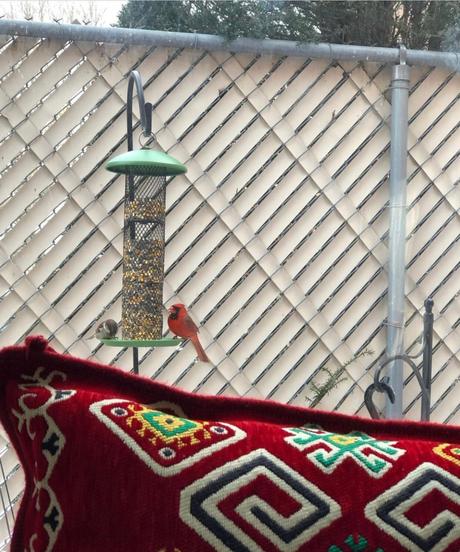
From my window seat, I look out on bright red geraniums and a bird feeder that brings different types of birds from all over the neighborhood into my yard. A red headed finch, blue jay, male and female cardinals, swallows, chickadees - all colors and types jabbering over this food source like it is manna come from Heaven. Perhaps, in a bird-like way, it has. Today I sighed as I looked out. The scene that greets me is so far from the reality of the tragedies on the world stage that I cringe. The question I ask is asked by many: How can I live in so much safety and peace when those around the globe are struggling so much?
From explosions in Lebanon, to an earthquake killing thousands in Haiti, to frantic news of Afghanistan falling to the Taliban, we are assaulted on all sides. It is not only information overload, it is also tragedy overload. I think many of us are feeling this, feeling the unfairness of life, and the helplessness in the face of all of these global events.
In the midst of this are our own trials, whether large or small. Some are facing seemingly insurmountable personal tragedies that leave no room for paying attention to larger, global tragedies. What is world shaking to the individual or family unit is often hidden from the wider world and cataloguing and comparing degrees of grief and loss is unhelpful. Though my bird feeder/geranium view is beautiful, I have my own deep pain and struggles during this season.
Where is goodness and grace in the midst of personal and gloabl tragedy? Or more personally - how can I contribute to goodness and grace in the midst of all that is going on?
A few months ago I wrote a piece called The Fragility of Goodness. In it I referenced a story from World War 2 that took place in Bulgaria, a story about small acts of courage that made a stunning difference for Bulgarian Jews. While some of the people who stood up for the Jews were leaders, others were ordinary people, people who would not be considered influencers in today's social media economy. They were people who decided to do the right thing, even if it seemed small. Each person in Bulgaria who spoke up for the Jews - people who were their friends, their neighbors, their business partners, their community members - was a chain in the link of goodness that ultimately preserved life and human dignity.The author of the account I read said " None of this would have happened without what the Bulgarian-French intellectual Tzvetan Todorov calls the 'fragility of goodness': the intricate, delicate, unforeseeable weave of human action and historical events." Todorov contrasts this goodness with evil, saying that once evil is introduced into public view, it spreads easily, whereas goodness is temporary, difficult, rare, fragile.
Perhaps from a philosopher's perspective, he sees this as true, but I disagree. Despite all the evil and sadness present in our world, there is goodness and it is not as fragile as he would have us believe. The mystery is that were are invited to be a part of that goodness, no matter how small. Goodness will never make the kind of headlines that evil makes, it will never create a show, instead goodness is content being a silent but persistent force. While evil is focused only on itself, goodness focuses on others. Goodness happens quietly, while evil is loud.
We dismiss small acts of goodness and kindness, opting instead to despair over our inability to do something big. We forget that any noble acts of goodness and courage started as acts that were seemingly insignificant. Tish Harrison Warren says in her book, Liturgy of the Ordinary, that peace on earth begins with forgiving and living at peace with people in your household, your parish or church, and your neighborhood. I would extend that to say goodness begins with at home, it extends to my neighbors - knowing some of their struggles and joys, offering cookies or help with taking out the garbage - and then moves on to my wider world. I might long to offer relief and goodness in Haiti, Lebanon, or Afghanistan but that is not where I am. I'm in Boston and it won't help any of those countries for me to get on a plane and fly in as a naive do-gooder.
What can we do when we feel helpless? When we want to do more? I don't think it is a stretch to say that a decision to be kind to the check out person who is always mean to you matters. I don't think it's a stretch to say that frail prayers and faith like a mustard seed are large in the Kingdom of God. I don't think it's off base to say that a donation, no matter how small, matters.
Goodness is not as fragile as we think. It's a strong thread in what becomes the tapestry of " the intricate, delicate, unforeseeable weave of human action and historical events."
Just a bit ago I read the following from an email from Christianity Today, and I offer it here as both challenge and encouragement:
Your calling may not be to humanitarian work, disaster relief, or medical care. But whatever your profession may be, you can take a moment to remember the God of compassion, consider the needs of a hurting world, and give your prayers, time, resources, or expertise to alleviate suffering...however large or small, public or private your act of compassion, you are joining with the body of Christ to display God's love in the world...
CT Women - August 18, 2021
"Go forth and do good" are the words I hear. I don't yet know what that means today, but in the intricate, delicate chain of goodness that is part of God's vast and mysterious economy, it matters.

